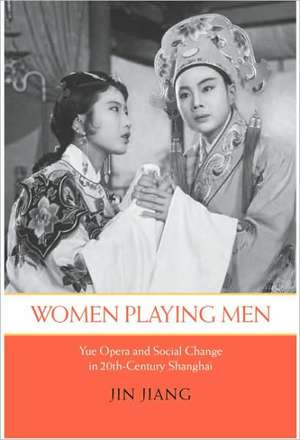Women Playing Men – Yue Opera and Social Change in Twentieth–Century Shanghai: Women Playing Men
Autor Jin Jiangen Limba Engleză Hardback – 13 apr 2009
Preț: 650.53 lei
Preț vechi: 844.84 lei
-23% Nou
Puncte Express: 976
Preț estimativ în valută:
124.50€ • 129.49$ • 102.78£
124.50€ • 129.49$ • 102.78£
Carte tipărită la comandă
Livrare economică 14-28 aprilie
Preluare comenzi: 021 569.72.76
Specificații
ISBN-13: 9780295988436
ISBN-10: 0295988436
Pagini: 352
Ilustrații: 26 illustrations
Dimensiuni: 152 x 229 x 15 mm
Greutate: 0.66 kg
Editura: MV – University of Washington Press
Seria Women Playing Men
ISBN-10: 0295988436
Pagini: 352
Ilustrații: 26 illustrations
Dimensiuni: 152 x 229 x 15 mm
Greutate: 0.66 kg
Editura: MV – University of Washington Press
Seria Women Playing Men
Recenzii
Women Playing Men very substantially contributes to our understanding of the still little-studied development of modern urban culture. It is full of insightful arguments that the admission of women to theater audiences transformed theater itself. Catherine Yeh, author of Shanghai LoveWomen Playing Men shows how an obscure rural genre became one of the most popular forms of local drama in the nation and how largely illiterate peasant women established themselves in the city and helped shape modern cosmopolitanism. It has broad implications of central concern to the fields of Chinese popular culture, women's history, and urban history. Hanchao Lu, author of Beyond the Neon Lights
Notă biografică
Cuprins
Preface
Introduction | Opera, Gender, and the City
1. The Origins of Yue Opera
2. The Rise of Feminine Opera
3. Patrons and Patronage
4. Staging in the Public Arena
5. The Opera as History
6. A Feminine Aesthetics
Conclusion
Appendix | Interviews and Informants
Notes
Chinese Character Glossary
References
Index
Descriere
Modern forces converge and gender roles are challenged in this groundbreaking volume that explores the influence of Yue opera--a subgenre of Chinese opera that transformed all-male opera into an all-female art form, with women cross-dressing as male characters.
